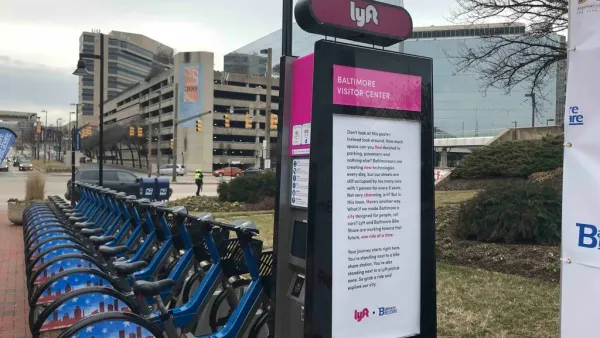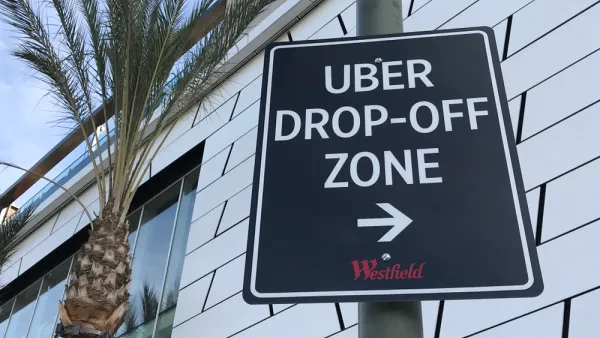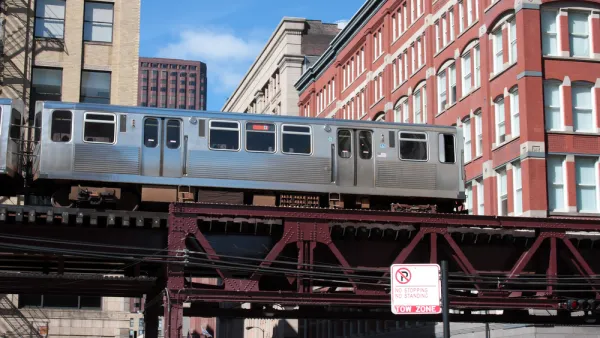A new Texas state law that regulates transportation network companies also overrides more restrictive local regulations, like Austin's requirement for fingerprinting drivers. Austin voters supported the tighter regulations at the ballot box last May.

On Memorial Day, Gov. Greg Abbott signed House Bill 100, which effectively ends the ban on ride-hailing enacted by the Austin City Council in December 2015 and supported by voters in May 2016.
Uber and Lyft put restrictions such as finger print requirements to a ballot test on May 7, 2016 with Proposition 1, but 56 percent of voters rejected the measure to overturn the regulations. The two companies suspended service in the city the following morning. [See Planetizen: "Op-Ed: Why Uber Wasn't Welcome in Austin."]
HB 100 "will override local provisions and provide regulatory certainty, creating a consistent framework across the state for popular ride-hailing companies, while still enforcing important customer safety standards," states the governor's office on the bill signing.
"It requires ride-hailing companies to have a permit from the Texas Department of Licensing and Regulation [TDLR] and pay an annual fee of $5,000 to operate throughout the state," reports Alex Samuels for The Texas Tribune. "It also calls for companies to perform local, state and national criminal background checks on drivers annually — but doesn't require drivers to be fingerprinted."
According to the department's FAQs on Transportation Network Companies (TNCs), they anticipate "publishing rules for the TNC program in the Texas Register on July 28, 2017, and adopting rules no later than September 29, 2017. Based on this timeline, we expect the TNC rules to take effect on November 1, 2017."
However, the ride-hailing companies need not wait for the publication of the rules. "Uber and Lyft said they resumed operations in Austin on Monday," adds Samuels. "Lyft also said it would relaunch in Houston on Wednesday (Uber is already operating in Houston.)"
FULL STORY: Uber, Lyft return to Austin as Texas Gov. Abbott signs ride-hailing measure into law

Analysis: Cybertruck Fatality Rate Far Exceeds That of Ford Pinto
The Tesla Cybertruck was recalled seven times last year.

National Parks Layoffs Will Cause Communities to Lose Billions
Thousands of essential park workers were laid off this week, just before the busy spring break season.

Retro-silient?: America’s First “Eco-burb,” The Woodlands Turns 50
A master-planned community north of Houston offers lessons on green infrastructure and resilient design, but falls short of its founder’s lofty affordability and walkability goals.

Test News Post 1
This is a summary

Analysis: Cybertruck Fatality Rate Far Exceeds That of Ford Pinto
The Tesla Cybertruck was recalled seven times last year.

Test News Headline 46
Test for the image on the front page.
Urban Design for Planners 1: Software Tools
This six-course series explores essential urban design concepts using open source software and equips planners with the tools they need to participate fully in the urban design process.
Planning for Universal Design
Learn the tools for implementing Universal Design in planning regulations.
EMC Planning Group, Inc.
Planetizen
Planetizen
Mpact (formerly Rail~Volution)
Great Falls Development Authority, Inc.
HUDs Office of Policy Development and Research
NYU Wagner Graduate School of Public Service




























